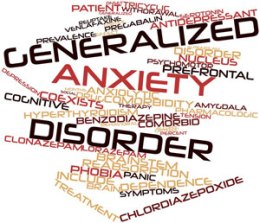Generalized Anxiety Disorder
Search by Name Search by Age Search by Symptoms
A B C D E F G H I J K L M N O P Q R S T U V W X Y Z
What is anxiety?
 Anxiety is a word that describes feelings of worry, nervousness, fear, apprehension, concern or restlessness. Normal feelings of anxiety often serve as an “alarm system,” alerting you to danger. For example, imagine coming home and finding a burglar in your living room. Your heart beats fast. Your palms get sweaty. Your mind races. In this situation, anxiety can provide an extra spark to help you get out of danger. In more normal but busy situations, anxiety can give you the energy to get things done.
Anxiety is a word that describes feelings of worry, nervousness, fear, apprehension, concern or restlessness. Normal feelings of anxiety often serve as an “alarm system,” alerting you to danger. For example, imagine coming home and finding a burglar in your living room. Your heart beats fast. Your palms get sweaty. Your mind races. In this situation, anxiety can provide an extra spark to help you get out of danger. In more normal but busy situations, anxiety can give you the energy to get things done.
But sometimes anxiety can be out of control, giving you a sense of dread and fear for no apparent reason. This kind of anxiety can disrupt your life.
Are there different types of anxiety?
Yes. Anxiety can be a general feeling of worry, a sudden attack of panicky feelings, or a fear of a certain situation or object.
What is generalized anxiety disorder?
Generalized anxiety disorder is ongoing anxiety that isn’t related to a particular event or situation, or is out of proportion to what you would expect. For instance, a person who has generalized anxiety disorder may constantly worry about a child who is perfectly healthy.
About 4 million adults in the United States have GAD. Women are more likely to have it than men. It usually begins to affect people when they are in their early 20s.
Symptoms
How do I know if I have GAD?
Most people worry from time to time, and these occasional worries are normal. They don’t mean that you have GAD. If you have GAD, you worry so much that it interferes with your day-to-day life, and you feel tense and worried more days than not. Other signs of GAD include the following:
- Trouble falling or staying asleep
- Muscle tension
- Irritability
- Trouble concentrating
- Getting tired easily
- Restlessness, or feeling “keyed up” or on edge
- Trembling
- Shortness of breath
- Fast heartbeat
- Dry mouth
- Dizziness
- Nausea
If you feel tense most of the time and have some of these symptoms, talk to your doctor. Your doctor will probably examine you and ask some questions to make sure that something else isn’t causing your symptoms. Sometimes certain kinds of medicine may cause GAD. You could also have these symptoms if your thyroid gland is too active, or if you are depressed. However, if your doctor doesn’t find any other reason for your symptoms, you may need to be treated for GAD.
Causes & Risk Factors
What causes anxiety disorders?
Suppose the fire alarm goes off in your home. You race around frantically to find the fire. Instead, you find that there is no fire–the alarm just isn’t working properly.
It’s the same with anxiety disorders. Your body mistakenly triggers your alarm system when there is no danger. This may be due to a chemical imbalance in your body. It may also be related to an unconscious memory, to a side effect of a medicine or to an illness.
Treatment
How is GAD treated?
People who have GAD must learn ways to cope with anxiety and worry. Talk to your family doctor if you think you have an anxiety disorder. He or she can help you form a plan to develop skills to cope with your anxiety. You’ll probably need some counseling to help you figure out what’s making you so tense. Also, you may need to take some medicine to help you feel less anxious. Your doctor can recommend the treatment that is right for you. The following are some tips on coping with anxiety:
Control your worry. Choose a place and time to do your worrying. Make it the same place and time every day. Spend 30 minutes thinking about your concerns and what you can do about them. Try not to dwell on what “might” happen. Focus more on what’s really happening. Then let go of the worry and go on with your day.
Learn ways to relax. These may include muscle relaxation, yoga, or deep breathing.
Steps to deep breathing
- Lie down on a flat surface.
- Place one hand on your stomach, just above your navel. Place the other hand on your chest.
- Breathe in slowly and try to make your stomach rise a little.
- Hold your breath for a second.
- Breathe out slowly and let your stomach go back down.
Muscle relaxation is simple. Start by choosing a muscle and holding it tight for a few seconds. Then relax the muscle. Do this with all of your muscles, one part of your body at a time. Try starting with your feet muscles and working your way up your body.
Exercise regularly. People who have anxiety often quit exercising. But exercise can give you a sense of well being and help decrease feelings of anxiety.
Get plenty of sleep. Sleep rests your brain as well as your body, and can improve your general sense of wellbeing as well as your mood.
Avoid alcohol and drug abuse. It may seem that alcohol or drugs relax you. But in the long run they make anxiety worse and cause more problems.
Avoid caffeine. Caffeine is found in coffee, tea, soft drinks and chocolate. Caffeine may increase your sense of anxiety because it stimulates your nervous system. Also avoid over-the-counter diet pills, and cough and cold medicines that contain a decongestant.
Confront the things that have made you anxious in the past. Begin by just picturing yourself confronting these things. By doing this, you can get used to the idea of confronting the things that make you anxious before you actually do it. After you feel more comfortable picturing yourself confronting these things, you can begin to actually face them.
If you feel yourself getting anxious, practice a relaxation technique or focus on a simple task, such as counting backward from 100 to 0.
Although feelings of anxiety are scary, they won’t hurt you. Label the level of your fear from 0 to 10 and keep track as it goes up and down. Notice that it doesn’t stay at a very high level for more than a few seconds. When the fear comes, accept it. Wait and give it time to pass without running away from it.
Use medicine if it helps. Your doctor may give you medicine to help reduce your anxiety while you learn new ways to respond to the things that make you anxious. Many types of medicine are available. Your doctor will decide which medicine is right for you.
Talk about your anxiety with your doctor. Your doctor can help you make a plan to cope with anxiety. Counseling can help you learn to express your needs and wants so you can feel more in control and hold in less of your anger and anxiety.
The most important thing is to take action. Action can help you gain a sense of control over your anxiety.
People who have GAD can get better. If you take medicine for generalized anxiety disorder, you may be able to stop taking it at some point in the future. Your doctor will tell you if it’s OK to stop taking your medicine.
source: FAMILYDOCTOR.org

Leave a comment
Comments 0